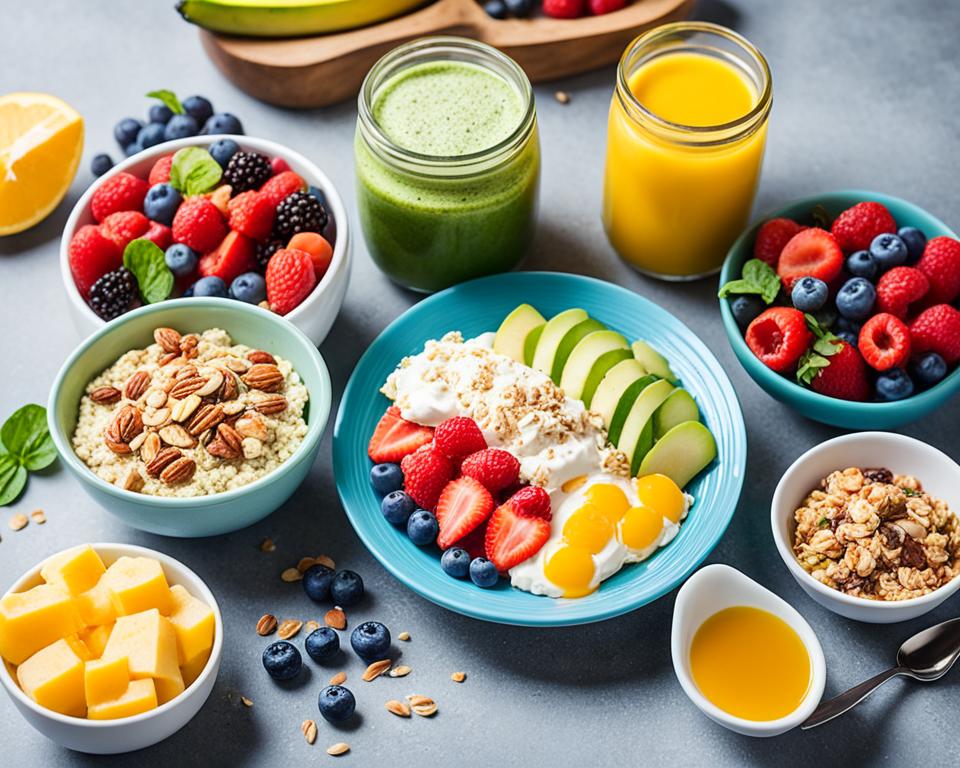Each year, about 700,000 surgeries remove gallbladders in the U.S. This shows how common gallbladder issues are. It’s crucial to change your diet after this surgery. Your digestive system will need time to adjust without the gallbladder.
The gallbladder normally stores and thickens bile to break down fats. But, after the surgery, bile goes straight to the small intestine. This change can cause digestive problems like diarrhea. To help your recovery, stick to a low-fat, easily digestible breakfast to avoid these issues. Great options are oatmeal, egg meals with lean meats, and fruit or veggie smoothies.
Understanding the Dietary Needs After Gallbladder Removal
The gallbladder is key in how our bodies digest food. It stores bile, which the liver makes to break down fats. When the gallbladder is removed, the process changes a lot.
The Role of Gallbladder in Digestion
The gallbladder held and made bile stronger. This strong bile helped break down fats in the small intestine. But, without a gallbladder, bile isn’t as strong. So, it’s harder for your body to digest fats well.
Challenges in Digesting Fats After Surgery
Without your gallbladder, fat digestion can be tough. It leads to issues like diarrhea and bloating when eating greasy foods.
Importance of a Low-Fat Diet
Eating low-fat is crucial after gallbladder removal. A low-fat diet helps the liver work better with the remaining bile. This lowers the chances of tummy troubles. It’s a good way to help your body heal after surgery.
Breakfast Options for a Smooth Transition
After gallbladder removal, switching to low-fat, easy-to-digest breakfasts is key for recovery. Options like oatmeal, whole grains, fruits, and veggie smoothies are great. They support digestion while your body adjusts.
Oatmeal and Whole Grains
Oatmeal, quinoa, and brown rice are top choices post-surgery. They’re packed with soluble fiber. This fiber helps your digestion run smoothly and can prevent diarrhea.
Low-Fat Dairy Alternatives
Choose low-fat dairy like skim milk or plant-based milks for a gentler breakfast. These options are light on your stomach but full of nutrients. They’re a better fit than high-fat dairy products right now.
Fruit and Vegetable Smoothies
Fruit and vegetable smoothies are a refreshing start to your day. They’re full of vitamins, minerals, and antioxidants. Unlike some breakfasts, they’re low in fat. This makes them ideal for your recovery.

What to eat for breakfast after gallbladder surgery?
| Food | How to Serve | Benefits |
|---|---|---|
| Oatmeal | Cooked with water or almond milk, plain | Gentle on stomach, provides fiber and energy |
| Smoothies | Made with bananas, berries, and almond milk | Easy to digest, nutrient-dense |
| Applesauce | Unsweetened, plain | Easy to digest, provides vitamins and fiber |
| Whole Grain Toast | Plain or with a small amount of avocado | Provides complex carbohydrates and fiber |
| Scrambled Eggs | Cooked with minimal oil | High in protein, easy to digest |
| Greek Yogurt | Plain, low-fat | Contains probiotics, high in protein |
| Cottage Cheese | Low-fat, plain | High in protein, easy to digest |
| Soft Fruits | Bananas, peaches, pears, peeled | Provides vitamins, minerals, and fiber |
| Quinoa Porridge | Cooked with water or almond milk | High in protein and fiber |
| Rice Cakes | Plain or with a small amount of nut butter | Light, easy to digest, provides carbohydrates |
| Chia Pudding | Made with almond milk and chia seeds | Provides fiber, omega-3 fatty acids |
| Avocado Toast | Whole grain bread with mashed avocado | Provides healthy fats, fiber, and vitamins |
| Baked Apples | Sliced, with cinnamon | Easy to digest, provides fiber and vitamins |
| Smoothie Bowls | Blended fruits with toppings like chia seeds | Nutrient-dense, easy to digest |
| Herbal Tea | Warm, with honey if desired | Hydrating, soothing for digestion |
| Plain Bagels | Without seeds or toppings | Provides carbohydrates, easy to digest |
| Plain Pancakes | Made with whole grain flour, without butter | Gentle on stomach, provides carbohydrates |
| Almond Milk | Plain or in smoothies | Dairy-free, easy to digest, provides calcium and vitamin D |
| White Rice | Cooked, soft | Gentle on stomach, provides energy |
| Pears | Peeled, cooked or soft | Gentle on stomach, provides fiber and vitamins |
After gallbladder surgery, try meals like oatmeal, whole grains, and smoothies. They are gentle on your digestion. Eggs are another good option. They are easy to digest and not high in fat. Enjoy them with lean proteins like turkey or chicken for a tasty, low-fat meal.
Nut butter, like peanut or almond butter, on whole-grain toast is also a smart choice. This meal gives you energy and is easy on your stomach. Plus, the fiber and healthy fats are good for your digestive system’s recovery.
Egg Dishes with Lean Proteins
Breakfast soft foods to eat after gallbladder removal include egg dishes. Not only are they delicious, but they’re good for you too. These low-fat breakfast recipes for gallbladder surgery recovery keep your digestion happy while nourishing your body.
Whole Grain Toast and Nut Butters
Another option is whole grain toast with nut butters for your breakfast after gallbladder surgery. This meal is rich in fiber and good fats. It supports your gallbladder surgery recovery well.
Managing Digestive Issues After Surgery
Diarrhea is common after getting your gallbladder removed. This happens because bile goes directly into the small intestine, acting like a laxative. To handle this, avoid fatty and spicy foods.
Dealing with Diarrhea
Keeping your body hydrated is vital. Drink lots of water, broth, and drinks with electrolytes. This will help replace the fluids you’re losing. Also, slowly start eating foods rich in fiber, like whole grains and fresh fruits. These can aid in balancing your digestion as you heal.
Avoiding Fatty and Spicy Foods
After gallbladder surgery, following a low-fat diet is a must. Avoid greasy, high-fat, and fried meals, as well as spicy foods. These can upset your digestive system as it gets used to not having a gallbladder.
Staying Hydrated
Staying hydrated is crucial for recovery. Drink plenty of water and fluids with electrolytes. This will help replace lost fluids from diarrhea and keep your digestive system working well.

Incorporating Fiber for Improved Digestion
Fiber is key for good digestion after gallbladder surgery. Both soluble fiber and insoluble fiber are important. They help keep gut motions regular and enhance digestion as you heal.
Soluble Fiber Sources
Think of oatmeal, beans, and berries for soluble fiber. It absorbs water, making stools heftier. This quality is great for countering diarrhea after gallbladder surgery.
Insoluble Fiber Sources
You’ll find insoluble fiber in whole grains, vegetables, and nuts. It adds bulk to move food along the gut. Including these high-fiber foods for gallbladder recovery aids in regularizing digestion.
Slowly increasing both soluble fiber and insoluble fiber is wise. This aids your digestive system in handling the absence of gallbladder. A smoother recovery and better digestive health may result.
FAQs on Breakfast
What are some recommended breakfast options after gallbladder surgery?
After gallbladder surgery, start your day with foods like oatmeal and egg dishes. Choose lean proteins with eggs. Fruit and veggie smoothies are also good. These low-fat options are easy to digest. They support your recovery and may prevent digestive issues.
Why is it important to follow a low-fat diet after gallbladder removal?
Without your gallbladder, bile goes straight into the small intestine. It’s not stored to help digest food. This change can make it hard to digest fatty foods. Eating low-fat means your digestive system works better. This can help avoid issues like diarrhea.
How can fiber help with digestion after gallbladder surgery?
Fiber, both types, can improve how your stomach works after surgery. Soluble fiber soaks up water in your gut. It helps make your stool bulkier. Insoluble fiber makes you have more regular bowel movements. Eating more high-fiber foods slowly can make digestion better as you heal.
What should be done to manage diarrhea after gallbladder surgery?
Don’t eat foods high in fat or spices if you have diarrhea after surgery. These can make your stomach upset. Keep hydrated by drinking water, broth, and drinks with electrolytes. This replaces what you lose. Add fiber foods back to your diet slowly. Fruits, veggies, and whole grains help keep your bowel movements regular as you recover.
